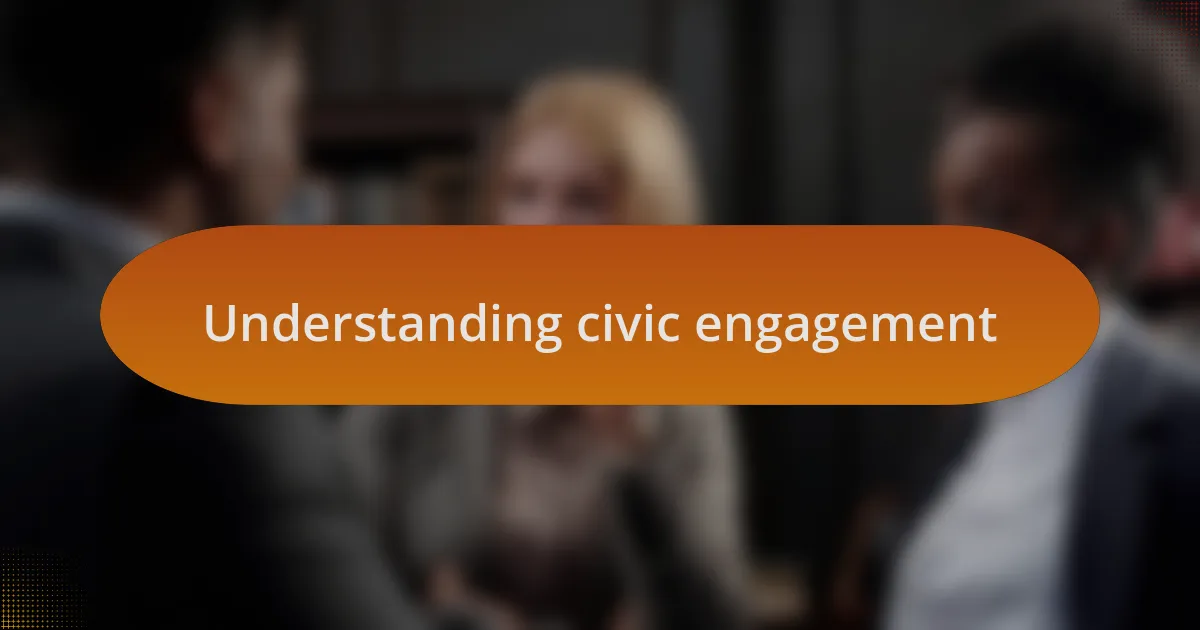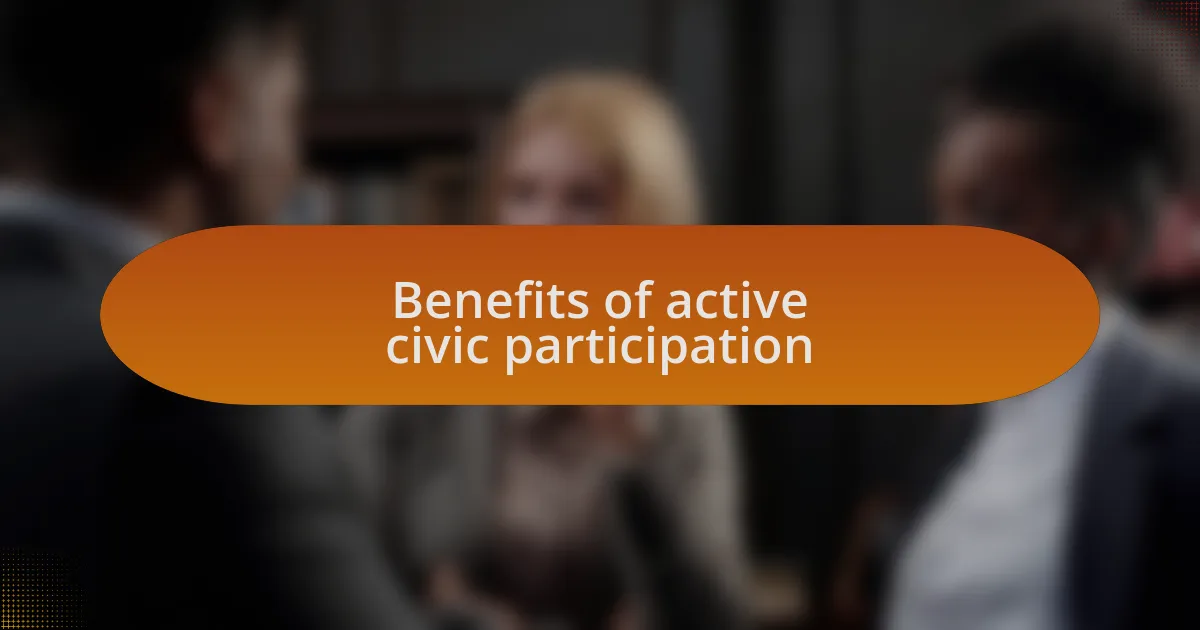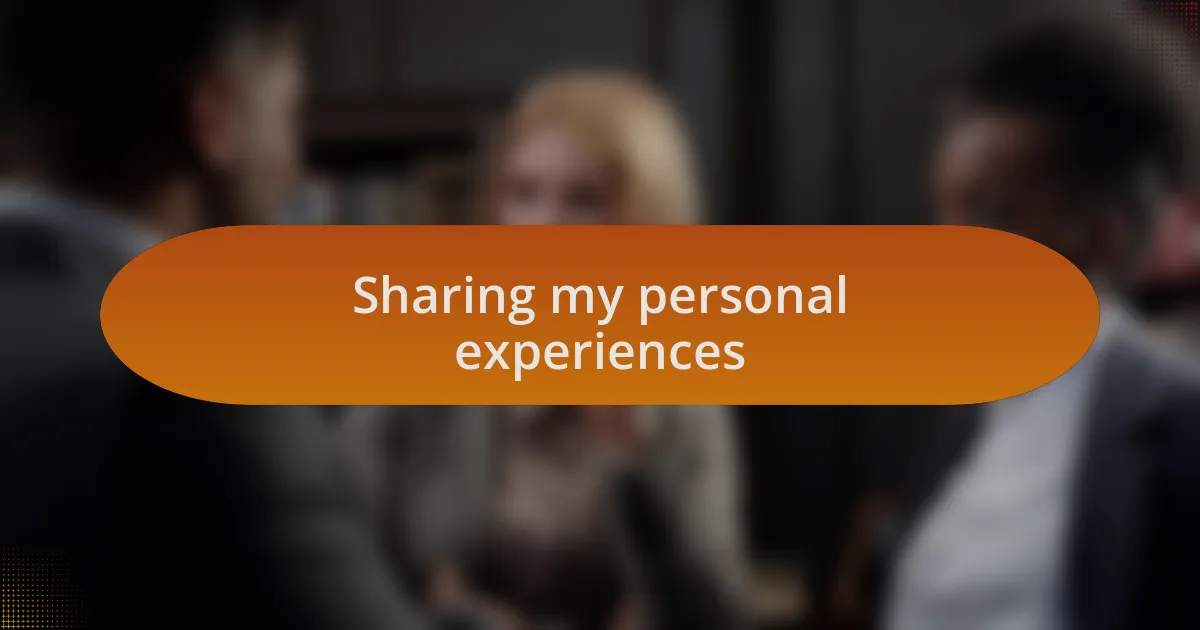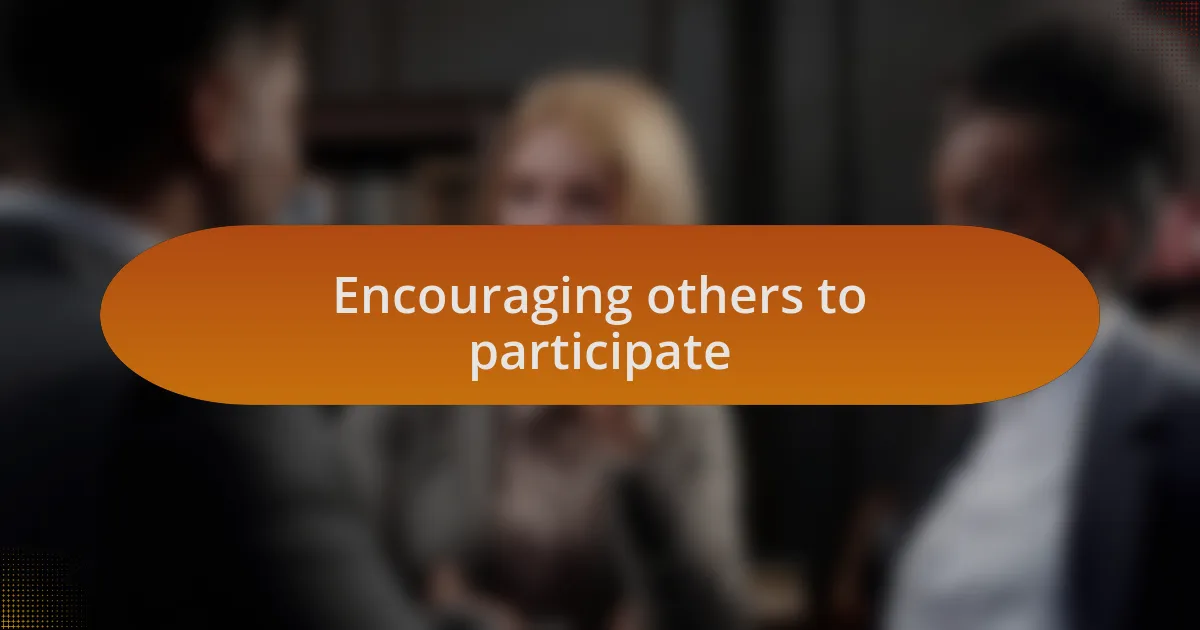Key takeaways:
- Civic engagement encompasses more than voting; it includes active participation in community initiatives and decision-making processes.
- Political media platforms empower individuals by amplifying marginalized voices and providing vital information to educate the public.
- Active civic participation fosters community connections, personal growth, and the ability to influence local change.
- Encouraging others to engage requires sharing personal stories, creating welcoming environments, and emphasizing the impact of small contributions.

Understanding civic engagement
Civic engagement is pivotal in shaping our communities and fostering a sense of belonging. When I participated in my first town hall meeting, I was struck by how my voice, along with others, could influence local decision-making. It made me wonder—how often do we really take the time to engage with our civic responsibilities?
Understanding civic engagement means recognizing it as more than just voting; it’s about being actively involved in the processes that affect our lives. I remember volunteering for a local charity initiative and realizing that even small actions contribute to broader societal change. Have you ever considered how your unique skills can make a difference in your community?
As I reflect on my experiences, I see civic engagement as a bridge connecting individuals to their communities. Whether it’s advocating for environmental policies or participating in community clean-up days, every effort counts. Isn’t it inspiring to think that our collective actions can lead to significant transformations?

Importance of political media platforms
Political media platforms play a crucial role in amplifying voices that often go unheard. I remember the first time I discovered a platform dedicated to grassroots activism; it felt like a lightbulb moment. It was empowering to see how people from all walks of life could unite and share their stories, sparking necessary dialogues about important issues. Have you ever experienced that thrill of finding a community that resonates with your beliefs?
Moreover, these platforms act as a vital source of information, helping to educate the public on pressing political matters. During a tense election season, I relied heavily on political media to stay informed about candidates’ positions. The accessibility of information made me feel more confident when discussing my opinions with friends and family. Can you imagine navigating such complex topics without a reliable source of information to guide you?
Finally, political media platforms facilitate accountability in leadership. I recall following a journalist who covered local government meetings and revealed discrepancies in proposed budgets. Her insights not only kept officials transparent but also encouraged individuals like myself to ask questions and demand answers from those in power. Isn’t it refreshing to think that we can hold our leaders accountable through the power of shared information?

Benefits of active civic participation
Active civic participation brings about a sense of community and belonging. I remember attending a local town hall meeting where residents voiced concerns about neighborhood safety. The energy in the room was palpable; when people come together to discuss their shared interests, it fosters connections that often feel missing in our fast-paced lives. Have you ever felt that surge of camaraderie when united by a common cause?
Moreover, engaging actively in civic matters enhances personal growth and awareness. I once volunteered for a community project focused on environmental sustainability, and the experience opened my eyes to issues I had previously overlooked. It’s not just about advocating for change but also about learning from those around you, broadening your perspectives, and challenging your assumptions. Isn’t it fascinating how stepping outside your comfort zone can lead to profound insights?
Additionally, civic engagement empowers individuals to influence decision-making processes. I’ve seen firsthand how a small group advocating for park renovations eventually led to a city-wide initiative. It’s a powerful reminder that our voices matter and can drive significant change. Have you considered how your own involvement could shape your community’s future?

Sharing my personal experiences
Sharing my personal experiences in civic engagement has been enlightening. One of my most memorable moments was organizing a community clean-up event. I vividly recall the mixture of excitement and nervousness as I reached out to neighbors for support. We ended up with more volunteers than I had anticipated, and seeing families come together, working side by side, was beyond rewarding. Have you ever witnessed how a shared goal can transform strangers into friends?
Another experience that sticks with me was participating in a grassroots campaign for a local initiative. The challenges we faced were overwhelming; there were late nights, numerous phone calls, and debates that felt never-ending. Yet, the sense of accomplishment when we finally celebrated our success as a community was indescribable. It really made me reflect on how persistence and teamwork can lead to tangible change. Have you ever pushed through difficulties for something you believed in, only to find the end result far outweighs the struggle?
I also think back to a heated debate I had with a friend about civic responsibilities. It surprised me how passionately we both felt, yet we had such differing opinions. This dialogue deepened my understanding of civic engagement as a dialogue rather than a monologue. It made me appreciate the importance of listening, even when I strongly disagree—what lessons have you learned from engaging in tough conversations?

Encouraging others to participate
Encouraging others to participate in civic engagement isn’t always straightforward, but I find that sharing the impact of our collective actions can be incredibly motivating. I remember discussing voting with a close friend who initially felt apathetic about the process. After sharing the stories of how previous elections had influenced our community, I saw a spark in her. Have you ever noticed how personal stories can light a fire in someone who didn’t see the value before?
I’ve also tried to create a welcoming atmosphere when inviting others to join civic activities. For example, when I started a local book club focused on political literature, I hosted our first meeting with snacks and open dialogue, which made it feel more like a friendly gathering than a formal discussion. This set the tone, encouraging even the shyest members to share their thoughts. What strategies have you found effective in helping others feel comfortable and excited to join the conversation?
Finally, I emphasize the power of small actions leading to larger movements. When I participated in a town hall meeting, I saw firsthand how a few passionate voices could inspire many others to speak up about key issues. It reminded me that even if someone feels their contribution isn’t significant, it can create a ripple effect. Have you ever felt hesitant to share your opinion, only to realize that your voice might just be the one someone else needed to hear?